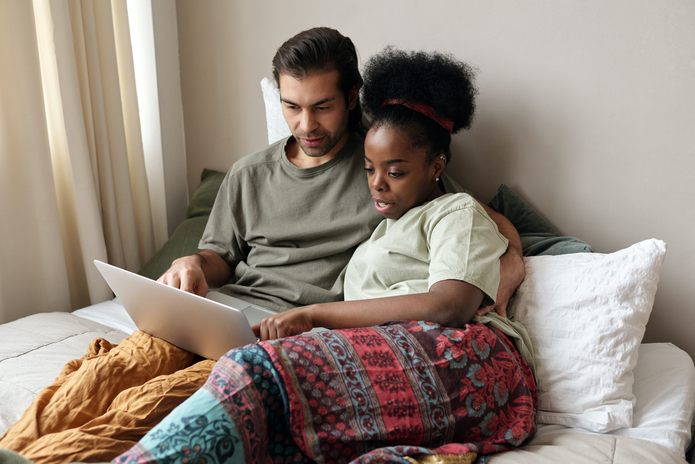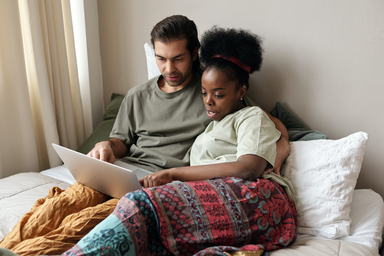A few weeks ago, I came to the realisation that I have become a trope – the kind of ‘boyfriend is my phone lock screen’ sort of trope. And my social media certainly seems to know it. I’ve been in my current relationship for just over a year and in that time my feed has been flooded with relationship memes and couple posts. While it hardly comes as a surprise that my social media is shaped around and reflects aspects of my life – with my interests such as running, working out, and cooking being reflected in my feed with posts from fitness influencers and recipe videos – it certainly felt strange when posts about being in a relationship first appeared on my screen.
Part of this strangeness came from the fact that, while many people recognise that each relationship is intensely unique and personal, shaped by the people in it and their own experiences and personalities, many of these relationship memes were asserting standards of what it is like to be in a relationship. This is not to say that every relationship meme and couple post is clearly and consciously declaring what it means to be in a relationship, but rather, like many trends and messages online, each post adds to a narrative. In the same way that the ‘girl dinner’ trend implicitly sends messages about what women eat, perhaps even what women should eat, as well as promoting unhealthy eating patterns, relationship posts and trends can implicitly send message about what a relationship is like, what a relationship should be like, as well as promoting unhealthy relationship norms.
For instance, as someone who has had an eating disorder, discussions around food and certain food behaviours have been a source of discomfort in relationships in the past. Fearing being forced to eat, or eat in a certain way, and being constantly dependent on others for support while also over analyzing what I eat compared to them have been behaviours that I had to heal in my recovery. However, when I started getting memes about ‘how much my boyfriend eats in comparison to me’ and posts joking about how a girlfriend can’t eat or eats in a disordered way unless their boyfriend is around were admittedly and undoubtedly triggering for someone with my past. Yet, even to my boyfriend, who has an incredibly healthy relationship with food, the memes seem problematic and unhealthy. It brings up. This brings up this question: how is it that, in a generation where feminism and female empowerment is so strong, we can be setting standards online of how little women eat and how dependent they are on men to adequately fuel themselves?
Furthermore, other online trends can often be problematic, such as being a ‘passenger princess’ – i.e., getting to relax while your partner is the one driving – which is often used in memes to joke about how bad girls are at driving. The potential harm of such trends can be seen more clearly in context of other memes, such ones about how girls act more helpless around their boyfriend but more capable when he isn’t around, which all seem to add to an outdated problematic narrative of ‘the helpless woman’ and the ‘big strong male protector’. Not only is this representation of gender roles in a relationship demeaning towards women, but it is also unhealthy and potentially harmful for men, fuelling toxic masculinity while adding to stigmas such as those surrounding men being open and vulnerable about their mental health.
Now, as I mentioned earlier, I am not saying that each and every post online about relationships has some hidden agenda – many of the people posting relationship memes with problematic or unhealthy messages may be unaware that those messages are present. Indeed, there are some couple posts which promote healthy norms, such as good communication, valuing each other’s time, showing affection, and even showing insights into a healthy and realistic sex life. Yet, the problem is – as with any message that tries to get promoted online – healthy and realistic standards get mixed in with the problematic and unhealthy ones. While this may not seem like a big issue, and some may argue that you can listen to the good advice and ignore the bad, the reality is that social media influences us: our views, behaviour and emotion are shaped somewhat by what we see online. Indeed, even the type of relationships we have are shaped by social media – with many people meeting online and interacting mainly online with each other.So, while passive aggressive posts commenting on your partner’s behaviour or memes about what it’s like to be in a relationship may be intended as a joke, they can have a much deeper impact. Just like with anything we post online or comment about in life, an awareness of the wider narrative you are adding to and the implicit messages that you could be sending is important. This may sound like an annoying or overly cautionary message, but in the same way your social media feed is shaped by and reflects aspects of your life, it would be naïve to ignore the way your social media feed is shaping and being reflected back into your own behaviours, views and emotions.


